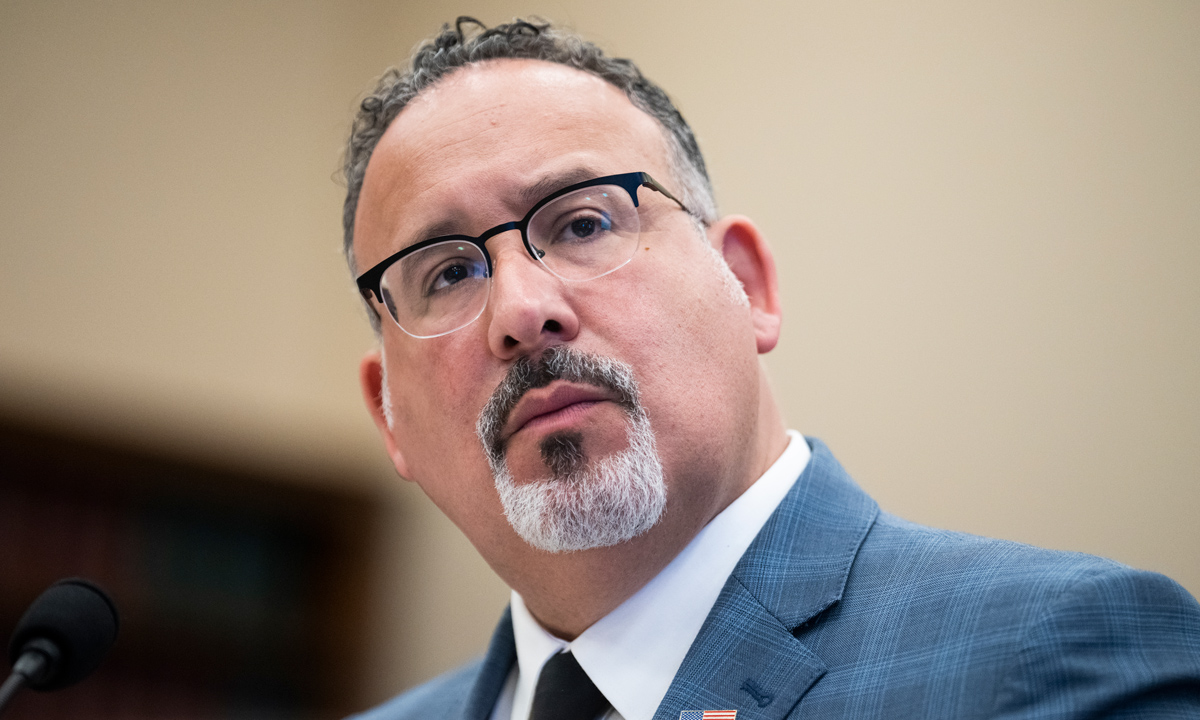Biden Administration Warns U.S. House GOP Debt Limit Bill Would Slash Education
Cardona said the bill would affect federal spending for low-income children, students with disabilities and college debt relief, among other programs.

Get stories like this delivered straight to your inbox. Sign up for The 74 Newsletter
U.S. Education Secretary Miguel Cardona last week said House Republicans’ debt limit proposal would cut vital education programs and harm vulnerable students across the U.S., such as those who are low income or have a disability.
“It would be taking us backwards,” Cardona said on a call with reporters.
U.S. House Speaker Kevin McCarthy’s plan would lift the nation’s borrowing capacity by $1.5 trillion or suspend it through March.
It would also set discretionary spending levels during the upcoming fiscal year to last year’s levels, meaning at least $130 billion in spending reductions to federal agencies.
McCarthy, a California Republican, plans to put the bill on the House floor as soon as Wednesday for a vote, and the administration stepped up its criticism in advance.
The White House said in a Tuesday statement that President Joe Biden would veto the proposal, calling it “a reckless attempt to extract extreme concessions as a condition for the United States simply paying the bills it has already incurred.” Biden has said debt limit legislation should not be tied to spending reductions.
Even if the bill is passed in the House, it’s highly unlikely to gain the 60 votes needed to move past the legislative filibuster in the Senate, where Democrats hold a slim majority.
At least 26 million students who are low income would see Title I funding levels for their schools drop, and more than 7 million students with disabilities would be affected by cuts in the Individuals with Disabilities Education Act, Cardona said.
He added that those cuts are equivalent to eliminating 60,000 teachers for low-income students and eliminating 48,000 teachers and related services providers from the classroom for students with disabilities.
The plan would also require states to return unspent pandemic funding, much of which went to helping schools reopen. Pandemic funding also provided mental health services for students.
“During the pandemic, students with disabilities were amongst the hardest impacted by the disruption of learning,” Cardona said.
State-by-state cuts
The Department of Education released a state-by-state breakdown of cuts to education-related programs in the GOP plan.
Among the estimated effects in Iowa:
- Cut about $25 million in Title I funding for Iowa schools serving low-income children, affecting an estimated 110,000 students.
- Cut Title IV, Part A funding for Iowa schools by about $1.9 million, limiting educators’ abilities to address student mental health issues, including through violence, suicide, and drug abuse prevention.
- Cancel President Biden’s student debt relief plan, keeping emergency student loan relief of up to $20,000 from 169,000 approved applicants across Iowa.
Potentially eliminate Pell Grants for 700 students in Iowa and also reduce the maximum award by nearly $1,000 for the remaining 169,000 students who receive Pell Grants.
A senior Department of Education official said the cuts in the debt relief plan also would make it harder for students to afford higher education.
Across the nation, it would mean an elimination of Pell Grants for about 80,000 students and more than 6 million Pell Grant recipients would have cuts of about $1,000 each annually, the administration said. Grants are tied to family income.
The Republican proposal would also nullify the executive order Biden issued last year to cancel federal student loan debt.
The bill would also prevent the agency from finalizing its income-driven repayment program, which sets a monthly repayment plan based on the borrowers’ income.
Biden’s executive order on student loans would cancel up to $10,000 in federal student debt for borrowers earning up to $125,000 annually, or up to $250,000 for married couples, with the boost to $20,000 in forgiveness for Pell Grant recipients.
The program only applies to current borrowers, not future ones, and income levels for the 2020 and 2021 tax years would be considered. Those who have private student loans are not eligible.
But the policy is currently on hold from taking effect due to two lawsuits, one from six Republican attorneys general and another by two student loan borrowers who do not qualify for the program.
The Department of Education has collected more than 24 million applications for the relief program, but had to stop due to an injunction.
The Supreme Court will make a decision on the policy in the coming months.
Regardless of the outcome, the Department of Education announced that the pandemic-era pause on federal student loan repayments will lift on June 30, and those borrowers will be required to begin repayments either after the Supreme Court’s decision or 60 days after the June deadline.
Iowa Capital Dispatch is part of States Newsroom, a network of news bureaus supported by grants and a coalition of donors as a 501c(3) public charity. Iowa Capital Dispatch maintains editorial independence. Contact Editor Kathie Obradovich for questions: [email protected]. Follow Iowa Capital Dispatch on Facebook and Twitter.
Get stories like these delivered straight to your inbox. Sign up for The 74 Newsletter

;)